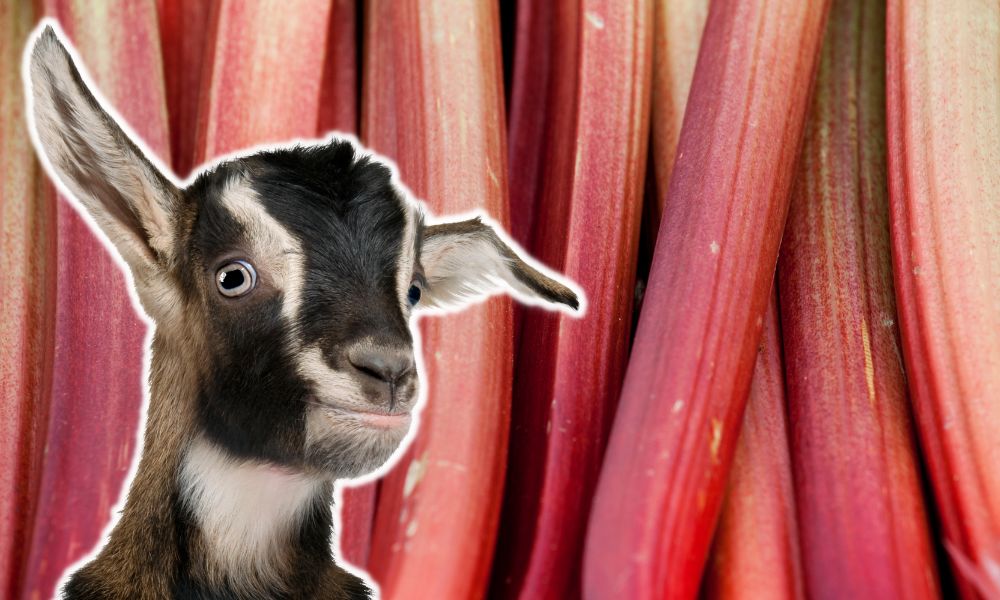So, unfortunately, it’s not as simple as saying goats can eat rhubarb no problem.
The stalks are perfectly safe and, naturally, that is the part we eat as well.
But you need to prepare it very carefully to make sure there is nothing of the leaves on it.
As long as you keep this in mind, you’ll have no problem.
Let’s look further into this.

Is rhubarb good for goats?
While keeping in mind the fundamental caveat that the stalks are safe, not the leaves, yes, in many ways!
For one thing, goats will just love the texture and the taste.
Rhubarb is a uniquely flavorful stalk, and so goats are known for being very attracted to it.
That is the best thing about it.
Beyond that, though, it does have a number of specific health benefits.
For one thing, it is a rich source of fiber.
Fiber is essential for a goat’s overall diet, and though you might think it would get plenty from all the hay or grass or forage it might eat, it can never really have too much.
They are also a fantastic source of antioxidants.
Antioxidants prevent the formation of free radicals in the goat’s cells, which damage them over time.
Antioxidants come in many forms, but things like vitamin C, for example, are powerful antioxidants.
Rhubarb is also a great source of vitamin K, which is important for bone formation and can prevent degeneration of the bones over time.
So, there are many benefits—let’s look at the caveats.
Is rhubarb bad for goats?
Rhubarb is not inherently bad for goats.
Again, just to reiterate, as long as you stay away from the leaves and only eat the stalks.
Other than that, there is no immediate danger with feeding your goat rhubarb.
That said, rhubarb should nevertheless only be fed in strict moderation.
A goat’s diet should be around 75% hay, and the rest made up of fresh fruits, vegetables and other high nutrient snacks like rhubarb.
If you feed your goats rhubarb too much, they will begin to show nutrient deficiencies, it may cause digestive pain, and they will most likely get bored of it.
Switch out rhubarb for other snacks, feeding them rhubarb perhaps once or twice a week.
This will keep them happy and get the greatest range of benefits.
Can goats eat raw rhubarb?
Yes, goats can eat raw rhubarb, and this is probably the best way to feed them rhubarb.
The diet that you provide for them should be the best approximation of what they would eat in the wild.
Naturally, they wouldn’t eat any cooked food in the wild.
Not to mention, the cooking process does deprive the rhubarb of some of its nutritional content.
So, overall, it’s best to eat the rhubarb raw.
Can goats eat cooked rhubarb?
They certainly can eat cooked rhubarb, and likely will have no problem—depending on how it was cooked, of course.
Sometimes, cooking ingredients like oils, spices, herbs or other things that are on the rhubarb could be problematic.
While there’s nothing inherently harmful in cooked rhubarb, and you would be fine to, say, share some leftovers with them, there’s no advantage to it either.
Where ever you can, let them eat raw rhubarb—leave the cooked rhubarb for yourself.
Now let’s have a quick look at the dangerous bit—the leaves.
Can goats eat rhubarb leaves?
No, they absolutely cannot.
While it may take a very large quantity to do serious harm, this doesn’t mean you shouldn’t keep your goat from eating them at all.
The problem with rhubarb leaves is that they contain high quantities of oxalates.
Oxalates are compounds found in many such leafy green plants, and are toxic to a number of similar animals like cows and horses.
This is because they can build up in the digestive system, causing kidney stones and many other similar issues.
Again, while you would need to feed your goat a fairly large quantity before it saw any serious adverse effects, there’s no reason to take the risk.
As long as you steer clear of the leaves, then, rhubarb is not only safe for your goats but in many ways highly nutritious, not to mention tasty.
Even though it may take a very large quantity of the leaves to cause a serious problem in most cases, it is still always better to be safe than sorry.
There’s no real advantage to letting them eat the leaves, so just leave them alone.
Give your goat some raw rhubarb to crunch on—it will appreciate it!
More in Vegetables
- Can Goats Eat Asparagus?
- Can Goats Eat Bamboo?
- Can Goats Eat Basil?
- Can Goats Eat Bok Choy?
- Can Goats Eat Broccoli?
- Can Goats Eat Brussel Sprouts?
- Can Goats Eat Cabbage?
- Can Goats Eat Carrots?
- Can Goats Eat Cauliflower?
- Can Goats Eat Celery?
- Can Goats Eat Garlic?
- Can Goats Eat Green Beans?
- Can Goats Eat Kale?
- Can Goats Eat Leeks?
- Can Goats Eat Lentils?
- Can Goats Eat Lettuce?
- Can Goats Eat Mushrooms?
- Can Goats Eat Parsley?
- Can Goats Eat Parsnips?
- Can Goats Eat Peas?
- Can Goats Eat Potato Peels?
- Can Goats Eat Potatoes?
- Can Goats Eat Radishes?
- Can Goats Eat Rhubarb?
- Can Goats Eat Soybeans?
- Can Goats Eat Spinach?
- Can Goats Eat Sweet Potatoes?
- Can Goats Eat Swiss Chard?
- Can Goats Eat Turnips?
- Can Goats Eat Watercress?

My son-in-law drives for Frito-Lay & brings out dated but otherwise ‘fresh’ potato & corn chips, cheese puffs & other products (packaged nuts, trail mix, etc.). Even in our household of 12, it’s far more than we can (or should) consume. I know these things are relatively safe, in moderation, but how much may they safely have in addition to their ‘good’ alfalfa hay & goat formula, grain concentrate?